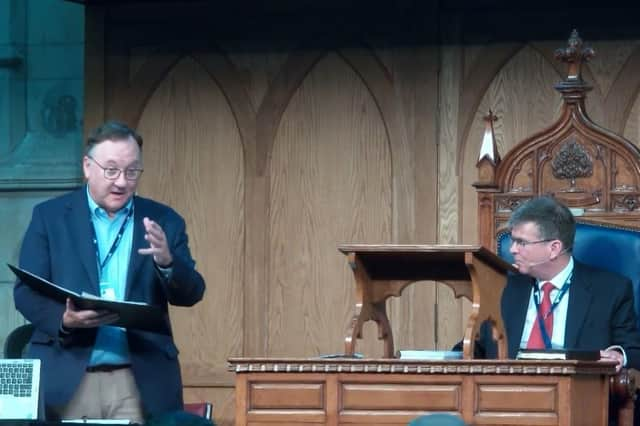Presbyterian General Assembly 2023: Leadership agrees to most radical shake-up of denomination in its history


Elders and ministers from the church's 525 congregations have taken the decision to face their declining membership head on in an increasingly secular age - rather than passively accepting managed decline.
Figures supplied to them in their Annual General Assembly report last week showed that families who contribute to the denomination declined by 6.5% from 2020-21.
Advertisement
Hide AdAdvertisement
Hide AdClerk of the general Assembly, Rev Trevor Gribben, told the News Letter yesterday that they will now move forward in agreeing the key principles of what the church will hold onto in the reconfiguration - and also the means by which they will move forward in their mission.
While membership has been declining slowly for years, the church still has over 200,000 members across the island of Ireland, and maintains significant influence in all walks of life - despite coming under fire for socially conservative positions on matters such as LGBT issues.
"This is our first Green Paper if you like - the first time we have ever done this in such a major way on what is perhaps the most important topic for the church - how do we fulfill our calling in mission and ministry," Rev Gribben said.
"There are principles and practicalities we have to decide on going forward. Neither are being set down as fait accomplis. Both are being set out for discussion as we seek to discern a way forward together.
Advertisement
Hide AdAdvertisement
Hide Ad"Essentially we have agreed on a discussion paper and we are moving into discussions now."
He added: "This coming year will be an important time for discussion and discernment as together throughout the whole church - right down to the local congregations level we try to discern those principles and the practicalities."
He is open about how massive an undertaking it is and said that ministers found the message of what lies ahead "challenging".
There is "some overlap" with rationalisation and turnaround strategies by many types of secular organisations in recent years, he accepts.
Advertisement
Hide AdAdvertisement
Hide AdIt is expected there will be less ministers covering more churches and that more lay persons will be trained up to support them in various roles. At present the church has 67 vacancies for ministers.
Failing churches will be closed while those that are thriving will have more resources directed to them.
Lessons will then be taken from success stories and applied sensitively to other 'middle of the road churches' in a bid to boost growth.
For newly planted churches, the emphasis is less on buildings, with many already meeting in community centres, Rev Gribben said.
Advertisement
Hide AdAdvertisement
Hide AdIn such churches, of which there are quite a number in the south, the demographics may look quite different from traditional Presbyterian churches, with many members from overseas and also former Catholics making up membership.
The report of the Reconfiguration of Ministry Task Group was proposed to the assembly on Friday night at Church Buildings in Belfast, by its convener Rev Dr David Bruce.
He said that the report "may be too radical for some, too extreme, asking the Church to think thoughts and consider options that they simply don’t want to. If we do these things, we’ll be going too far, too fast – for some. For others, it won't be radical enough, just tinkering at the edges, but failing to go anywhere near far enough. For them, if we only do what’s in the Report, we’ll just be re-arranging the deck chairs."
He also said it was important to stress that the report “is not seeking to change our theology".
Advertisement
Hide AdAdvertisement
Hide AdAlso addressing the assembly was the Task Group’s chair, Rev William Henry, who seconded the Report.
"This is not a straitjacket, this is a ‘launchpad,” he said.
The immediate challenge was to do five things, he added; to close some churches, manage decline in others that have reached the end of their life cycle, support some presently declining churches that they might grow, support churches that are currently growing and also to plant new churches.
A report on progress the strategy will come back to the 2024 General Assembly for consideration.